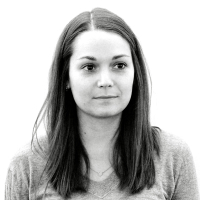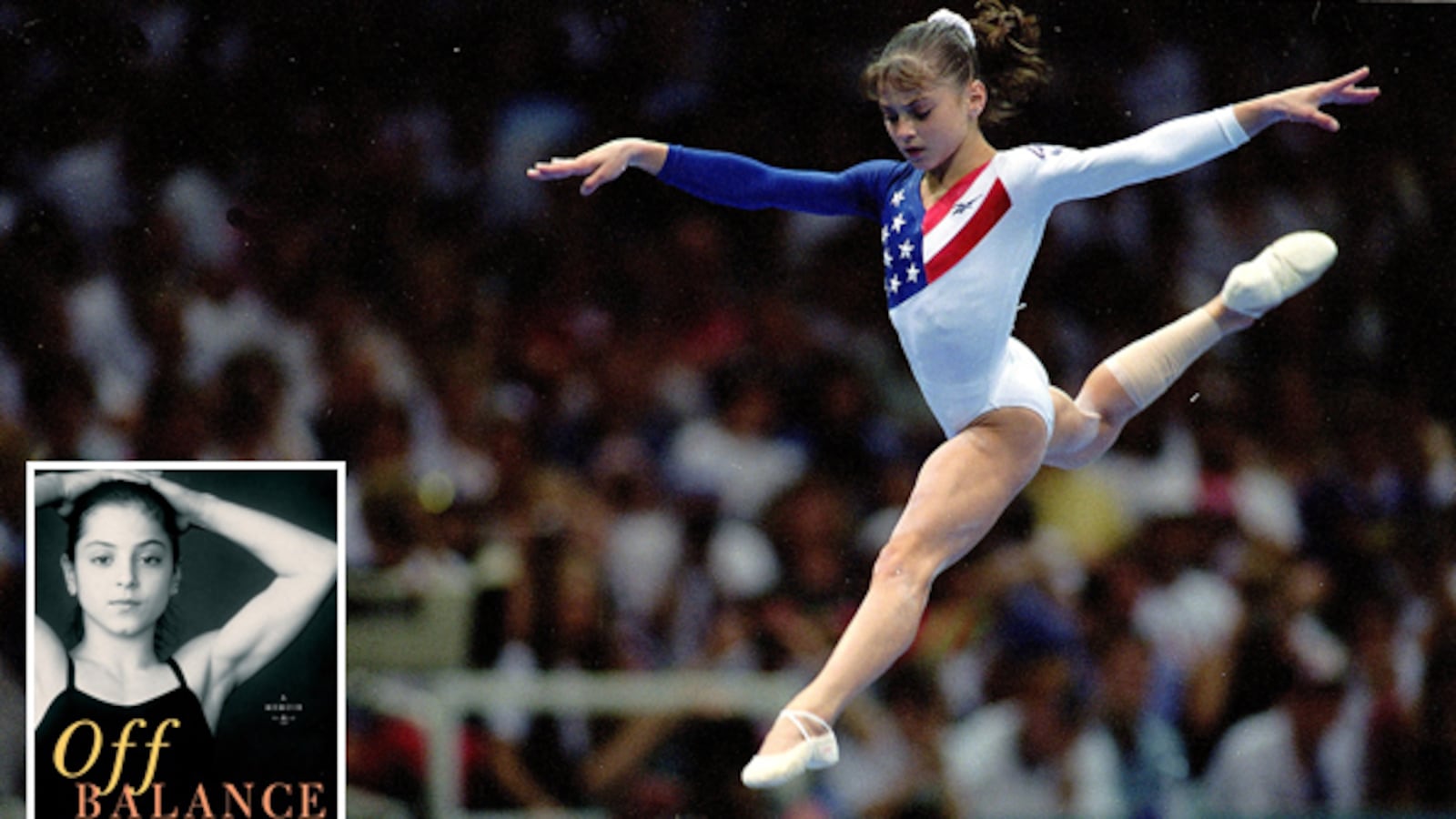At 14, Dominique Moceanu was the youngest member of the Olympic gold-medal-winning 1996 U.S. women’s gymnastics team in Atlanta. Now 30, Moceanu digs deep into her past and confronts some of the most painful memories from her stressful childhood, including dealing with a relentless father and the allegedly abusive coach Bela Karolyi. The Daily Beast picks the best bits from Off Balance.
A Secret Sister
Moceanu begins her book describing how she found out for the first time that she had a sister. In December of 2007, a nine-month pregnant Moceanu picked up a package from the post office. It contained photographs, legal documents, and a letter from a woman claiming to be her sister. When she confronted her mother, she admitted to giving up her second child for adoption—her father explained that the decision was purely financial.
The Frighteningly Fierce Father
Moceanu recalls her “old-school Romanian” father who “ruled our house with an iron fist,” making all family decisions without discussion:
We often found ourselves hiding in separate rooms. I can barely recall a single holiday when my father didn’t make a scene or create some kind of chaos. We were always walking on eggshells. As a child, I never understood his rage, and I still struggle to understand why he did such horrible things to the family he was supposed to love.
Her Career Begins—At Age 3
Moceanu recalls her earliest memories of gymnastics classes at age 3, at Northbrook Square Gymnastics in Chicago, where her father had moved the family for a job opportunity:
Beyond the ethnic and cultural issues that ostracized me, I was also physically different. I was awkward-looking with huge brown eyes, dark brown, pencil-straight hair styled into an old-school Romanian bowl haircut from the 1980s. And I was very, very small. I was always the tiniest kid on my street and in my classes at school … The gym was the one place I didn’t have to worry about feeling awkward for being so petite.
Given Over to Bela Karolyi
Moceanu’s father moved the family to Tampa, Fla., to get out of the Chicago cold and to make it possible for Dominique to train at LaFleur’s gym, with a team of coaches she soon fell in love with. Unbeknownst to her, when she was 5 her father had also contacted Bela Karolyi, a world-famous gymnastics coach who ran a gym with his wife in Houston. As soon as Moceanu was 9 and had some significant training, her father called Karolyi again to tell him his daughter was ready for an evaluation. Not long after, the family moved to Houston. Though the Karolyis had coached Olympic gymnasts, including one of Moceanu’s heroes, Nadia Comaneci, training with them wasn’t what she’d expected. The Karolyis were constantly hiring and firing coaches seemingly on a whim, but Moceanu was lucky to develop a good relationship with one coach, Alexander Alexandrov—that is, until he had sufficiently prepared her for the Olympics and Karolyi could swoop in and take credit for her skills:

Soon after the Karolyis stepped in, my body began to break down … I can’t count the number of times I watched other gymnasts push through unreasonable and dangerous pain just so they wouldn’t have to admit to the Karolyis that they were hurting in the gym. It happened to others time and again and, for me, it ultimately led to my body breaking down right before the biggest competition of my life, the 1996 Olympic Games, with a stress fracture in my right tibia. The Karolyis knew when I was injured—it was obvious to everyone in the gym—but they also knew I didn’t dare complain about my pain. If I ever started to talk about my pain or injury, they would immediately cut me off, dismissing it and making comments or gestures that I was becoming weak, faking, or exaggerating injury out of laziness.
No Food
During the summer, the brutal coaches brought their gymnasts to their ranch outside Houston, where they would exercise for hours in the heat, with no air conditioning and no food. “Bags of food? No one told me that we had to bring our own food. No one ever told me or mama that they didn’t serve food at the ranch. I was 10 years old, for crying out loud!”

An Adopted Aunt
“My dearest friend and my most trusted confidante to this day is Janice Ward,” Moceanu writes. “Janice came into my life like an angel when I was 10 years old. I call her my “adopted aunt.” When I met her, I needed her more than I realized.” Janice, a masseuse and physical therapist, also served as the Moceanu’s “slice of American pie, introducing and explaining to my family aspects of American culture and traditions that we never understood or even knew about.” She also recognized, unlike the rest of the adults in Moceanu’s life, that she was simply a child. “She tells me know that it broke her heart to see a young girl not experiencing the joys of childhood.”
Alienated From the Team
“Aside from Kerri, I rarely had a chance to talk with the other Magnificent Seven gymnasts leading up to and during the Olympics because we were all spread out training in different gyms and saw one another only at the actual competitions,” Moceanu says. “I was given very strict rules by the Karolyis and was allowed to leave my hotel room only for practice, competition, physical therapy, and meals, so there wasn’t much opportunity to get to know them at the Olympics. Kerri and I had to sit with the Karolyis for all of our meals, while the other five teammates (Amanda Borden, Amy Chow, Dominique Dawes, Jaycie Phelps, and Shannon Miller) would sit together during the games. I’d always look over at them as they laughed and talked, and wish I could join them. I’m sure they wondered why the heck Kerri and I never sat with them. I felt badly because it alienated us from the rest of the team to some extent, but deep down I hoped they understood that it was our coaches who didn’t permit it.”
Body-Image Issues
Moceanu’s coaches put so much pressure on her to be a certain weight that she developed a “warped body image [that] would haunt me for years to come.” She became obsessed with food, thinking she was fat when, at age 14, she only weighed 70 pounds, and she was eating in secret. “I had been so obedient for so long, trying to follow all of their rules to the letter, but no matter how well I listened, I was still scolded and humiliated and made to feel worthless, stupid, and, yes, fat. What did I have to lose?”
Striking Gold
The second-to-last member of Team USA’s Magnificent Seven to compete, Moceanu was shocked and disappointed when, after completing all her other routines perfectly, she missed the landing on both attempts at the vault—usually her best discipline. She looked to her coaches for help, but received nothing useful, having already realized that the attention and support she’d seen the Karolyis give gymnasts on TV had been purely for the cameras. When her teammate, Kerri Strug, landed the final vault perfectly and the Team USA had secured the gold, Moceanu could only think of what her parents’ reaction to her falls would be:
“Come on, Dominique! We just won the gold medal! Be happy!” Jaycie said excitedly. I wished I could feel like her and all my teammates, who were excited and truly living in the moment. Watching them hug each other and celebrate, I realized then that no matter how much I wanted to feel happy, my happiness depended on what my coaches and parents thought of my performance and whether or not they were pleased with me. It was hard to be happy when I felt I wasn’t perfect enough for them. Maybe I didn’t deserve to be happy.
Freedom
Her relationship with her father was just as volatile as ever, if not more. “Tata,” as she calls him, was in control of all of the money she was earning from competitions, appearances, and photo ops. He sunk tons of money into building a huge gym that he could not manage. One night after her father blew up at her for inviting friends over to the house, the 17-year-old ran away. She hired a lawyer and became emancipated, discovering that she made nearly $1 million on her own. “Perhaps not a ton of money by today’s standards, and not the ‘millions’ Tata sometimes exaggeratedly boasted of, but for me and my family—immigrants who had fled the oppression of Romania—it was an enormous amount of money.” But her father had already spent almost all of it.
The Police Are Involved
Not long after, her father waited for her outside her school and followed her in his car until she pulled over and spoke to him briefly. After returning home from this strange encounter, the police visited her and told her that her father had hired a private investigator, who had come to them when her father started making crazy comments about hiring people to “take out” one of her former coaches and the man he’d hired to help build his gym. Her father’s two alleged targets were encouraged to “leave town immediately and ‘disappear’ for a while.”






